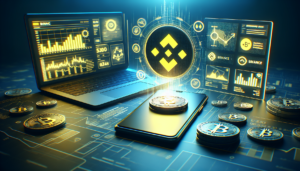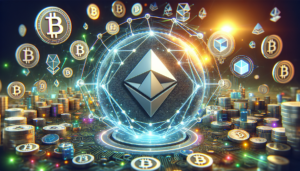What Does NFT Mean?
NFT stands for Non-Fungible Token, a unique digital asset that represents ownership of a specific item or piece of content. Unlike cryptocurrencies such as Bitcoin, which are interchangeable and fungible, each NFT is one-of-a-kind and cannot be replaced by another identical token. This uniqueness makes NFTs particularly valuable for representing digital assets like art, collectibles, and virtual real estate.
Definition of NFTs
NFTs are digital tokens that use blockchain technology to verify ownership and authenticity. When an NFT is created, or “minted,” it is assigned a unique digital signature that cannot be altered or replicated. This signature ensures that the NFT remains distinct and can be traced back to its original creator. By owning an NFT, you possess a digital certificate of ownership for the associated asset, whether it’s a piece of art, a collectible, or any other digital item.
How NFTs Differ from Cryptocurrencies
While NFTs and cryptocurrencies both utilize blockchain technology, they serve different purposes. Cryptocurrencies like Bitcoin and Ethereum are designed to function as digital currencies, with each unit being interchangeable and holding the same value. In contrast, NFTs are unique digital assets that derive their value from their rarity and the perceived worth of the associated item they represent. Unlike cryptocurrencies, NFTs cannot be directly exchanged for one another, as each token represents a distinct asset with its own characteristics and value.
How NFTs Work
Blockchain Technology and NFTs
NFTs rely on blockchain technology to ensure the security, transparency, and immutability of ownership records. Most NFTs are created and stored on the Ethereum blockchain, which is a decentralized, distributed ledger that maintains a permanent and unalterable record of transactions. When an NFT is minted, the associated data, including the creator’s information and the token’s unique identifier, is recorded on the blockchain. This data cannot be modified or deleted, providing a secure and transparent way to verify ownership and authenticity.
Role of Smart Contracts in NFTs
Smart contracts play a crucial role in the creation, transfer, and management of NFTs. A smart contract is a self-executing code that is stored on the blockchain and automatically enforces the terms of an agreement between buyers and sellers. When an NFT is minted, a smart contract is created to govern the token’s ownership and any associated rights, such as royalties for the creator on subsequent sales. These smart contracts ensure that the terms of ownership and transfer are executed automatically, without the need for intermediaries or manual intervention.
Common Uses of NFTs
NFTs in Digital Art
One of the most prominent applications of NFTs is in the digital art world. Artists can create digital artworks and mint them as NFTs, allowing collectors to purchase and own unique digital pieces. By tokenizing their art, creators can monetize their work in new ways and reach a global audience of collectors. NFTs provide a way for digital artists to assert ownership over their creations and benefit from the value appreciation of their work in the secondary market.
NFTs in Collectibles and Music
NFTs have also gained traction in the collectibles and music industries. Rare digital collectibles, such as limited-edition virtual cards, in-game items, and digital memorabilia, can be represented as NFTs, allowing fans and collectors to own and trade unique digital assets. In the music industry, artists can create NFTs that represent exclusive content, such as unreleased tracks, music videos, or virtual concert tickets. By offering these unique experiences and collectibles as NFTs, musicians can connect with their fans in new ways and generate additional revenue streams.
NFTs in Virtual Real Estate
Virtual real estate is another area where NFTs are making an impact. In virtual worlds and metaverses, land parcels and properties can be tokenized as NFTs, allowing users to own, buy, and sell virtual real estate. These digital spaces can be used for various purposes, such as creating immersive experiences, hosting events, or displaying digital art. As the concept of virtual ownership becomes more prevalent, NFTs provide a secure and verifiable way to represent and trade these digital assets.
NFT Marketplaces
Popular NFT Marketplaces
As the NFT market has grown, numerous marketplaces have emerged to facilitate the buying, selling, and trading of these digital assets. Some of the most popular NFT marketplaces include:
- OpenSea: The largest and most comprehensive NFT marketplace, offering a wide range of digital assets across various categories.
- Rarible: A user-friendly platform that allows creators to mint and sell their own NFTs, with a focus on art and collectibles.
- Foundation: An exclusive marketplace that curates high-quality digital art and supports artists through a unique auction system.
- SuperRare: A platform dedicated to single-edition digital artworks, focusing on scarcity and curator-led artist promotion.
How to Buy and Sell NFTs
To buy or sell NFTs on these marketplaces, users typically need to have a digital wallet that supports the blockchain on which the NFTs are built, such as Ethereum. Buyers can browse the available NFTs, place bids in auctions, or purchase them outright at a fixed price. Sellers can create listings for their NFTs, set prices, and wait for interested buyers. When a transaction is completed, the NFT is transferred to the buyer’s wallet, and the seller receives the payment in cryptocurrency. Some marketplaces also charge a fee or take a percentage of the sale price as a commission.
Legal and Environmental Considerations
Legal Implications of NFTs
As with any emerging technology, NFTs present some legal challenges and uncertainties. One key issue is the question of intellectual property rights and ownership. While NFTs provide a way to represent ownership of a digital asset, they do not necessarily grant the buyer the copyright or exclusive rights to the underlying item. Creators must be clear about the rights they are granting to buyers, and buyers should be aware of what they are purchasing. Additionally, there are concerns about the potential for fraud, counterfeiting, and money laundering in the NFT market, which may require further regulation and oversight.
Environmental Impact of NFTs
Another important consideration is the environmental impact of NFTs. The creation, transfer, and storage of NFTs on blockchain networks like Ethereum require significant computational power, which translates to high energy consumption. This energy-intensive process has raised concerns about the carbon footprint and sustainability of the NFT market. However, efforts are being made to address these issues, such as the development of more energy-efficient blockchain networks and the use of renewable energy sources for mining and transaction processing.
Emerging Trends in NFTs
NFTs in Gaming and Virtual Reality
NFTs are finding new applications in the gaming and virtual reality industries. Game developers are using NFTs to represent in-game items, characters, and virtual land, allowing players to own and trade these unique digital assets. This integration of NFTs into gaming creates new opportunities for player engagement, monetization, and the development of player-driven economies. In virtual reality, NFTs can be used to represent virtual objects, avatars, and experiences, enabling users to own and interact with unique digital assets within immersive environments.
NFTs and Digital Identity
NFTs are also being explored as a means to represent and manage digital identities. By associating an individual’s personal information, credentials, and achievements with an NFT, users can create a secure and verifiable digital identity that can be used across various platforms and applications. This concept of self-sovereign identity empowers individuals to control their personal data and selectively share it with third parties when necessary. As the use of NFTs for digital identity evolves, it has the potential to revolutionize industries such as education, healthcare, and finance, where secure and portable identity solutions are crucial.
See also:






